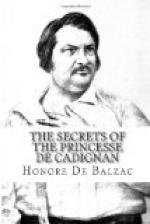Until two o’clock in the morning they spent their time in saying to each other the silly things that women of genius, like the princess, know how to make adorable. Diane pretended to be too worn, too old, too faded; D’Arthez proved to her (facts of which she was well convinced) that her skin was the most delicate, the softest to the touch, the whitest to the eye, the most fragrant; she was young and in her bloom, how could she think otherwise? Thus they disputed, beauty by beauty, detail by detail with many: “Oh! do you think so?”—“You are beside yourself!”—“It is hope, it is fancy!”—“You will soon see me as I am.—I am almost forty years of age. Can a man love so old a woman?”
D’Arthez responded with impetuous and school-boy eloquence, larded with exaggerated epithets. When the princess heard this wise and witty writer talking the nonsense of an amorous sub-lieutenant she listened with an absorbed air and much sensibility; but she laughed in her sleeve.
When d’Arthez was in the street, he asked himself whether he might not have been rather less respectful. He went over in memory those strange confidences—which have, naturally, been much abridged here, for they needed a volume to convey their mellifluous abundance and the graces which accompanied them. The retrospective perspicacity of this man, so natural, so profound, was baffled by the candor of that tale and its poignancy, and by the tones of the princess.
“It is true,” he said to himself, being unable to sleep, “there are such dramas as that in society. Society covers great horrors with the flowers of its elegance, the embroidery of its gossip, the wit of its lies. We writers invent no more than the truth. Poor Diane! Michel had penetrated that enigma; he said that beneath her covering of ice there lay volcanoes! Bianchon and Rastignac were right; when a man can join the grandeurs of the ideal and the enjoyments of human passion in loving a woman of perfect manners, of intellect, of delicacy, it must be happiness beyond words.”
So thinking, he sounded the love that was in him and found it infinite.
CHAPTER V
A trial of faith
The next day, about two in the afternoon, Madame d’Espard, who had seen and heard nothing of the princess for more than a month, went to see her under the impulse of extreme curiosity. Nothing was ever more amusing of its kind than the conversation of these two crafty adders during the first half-hour of this visit.
Diane d’Uxelles cautiously avoided, as she would the wearing of a yellow gown, all mention of d’Arthez. The marquise circled round and round that topic like a Bedouin round a caravan. Diane amused herself; the marquise fumed. Diane waited; she intended to utilize her friend and use her in the chase. Of these two women, both so celebrated in the social world, one was far stronger than the other. The




